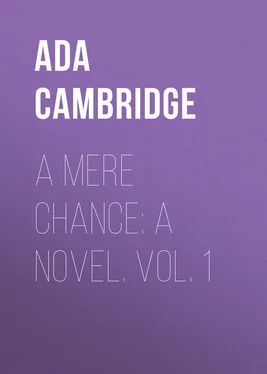Ada Cambridge - A Mere Chance - A Novel. Vol. 1
Здесь есть возможность читать онлайн «Ada Cambridge - A Mere Chance - A Novel. Vol. 1» — ознакомительный отрывок электронной книги совершенно бесплатно, а после прочтения отрывка купить полную версию. В некоторых случаях можно слушать аудио, скачать через торрент в формате fb2 и присутствует краткое содержание. ISBN: , Жанр: foreign_antique, foreign_prose, на английском языке. Описание произведения, (предисловие) а так же отзывы посетителей доступны на портале библиотеки ЛибКат.
- Название:A Mere Chance: A Novel. Vol. 1
- Автор:
- Жанр:
- Год:неизвестен
- ISBN:http://www.gutenberg.org/ebooks/38083
- Рейтинг книги:4 / 5. Голосов: 1
-
Избранное:Добавить в избранное
- Отзывы:
-
Ваша оценка:
- 80
- 1
- 2
- 3
- 4
- 5
A Mere Chance: A Novel. Vol. 1: краткое содержание, описание и аннотация
Предлагаем к чтению аннотацию, описание, краткое содержание или предисловие (зависит от того, что написал сам автор книги «A Mere Chance: A Novel. Vol. 1»). Если вы не нашли необходимую информацию о книге — напишите в комментариях, мы постараемся отыскать её.
A Mere Chance: A Novel. Vol. 1 — читать онлайн ознакомительный отрывок
Ниже представлен текст книги, разбитый по страницам. Система сохранения места последней прочитанной страницы, позволяет с удобством читать онлайн бесплатно книгу «A Mere Chance: A Novel. Vol. 1», без необходимости каждый раз заново искать на чём Вы остановились. Поставьте закладку, и сможете в любой момент перейти на страницу, на которой закончили чтение.
Интервал:
Закладка:
Rachel looked at him with awe. There was a flippancy in the way he spoke of that twenty thousand pounds which almost shocked her.
"If you are going to build a palace," she said, "don't talk of asking my help. I have never had anything to do with that kind of thing."
"Oh, my dear Miss Fetherstonhaugh – really it will be nothing but an ordinary good-sized, comfortable house, and I am sure your taste would be perfect. At any rate, you will help me with the gardens? I mean to have good grounds, whatever else I go without; and ladies always know how to lay out beds and things better than we do."
" I shouldn't know," she said, smiling; "but I think my aunt is very clever at that. We have beautiful flowers – even so late as this."
"So I see." He glanced admiringly at the rose on her breast, and she stuck her pretty chin into her throat and looked at it too. "What a lovely bud that is! Marshal Neil, is it not? Oh, don't take it out – the black fur on your jacket makes such a charming background for it."
Rachel already had it in her hand, and was stroking the velvety yellow petals and the dark green leaves.
"We have plenty of them," she said; "there is a wonderful autumn bloom of roses just now. This is a picture, isn't it? with that deep colour like an apricot in the heart, and those scarlet stains streaking it outside. Would you like to have it?" And she held it out with a frank gesture and the most captivating smile; and then, as he took it with a low bow and much ostentatious gratitude, she blushed the deepest crimson to the roots of her golden hair.
At this moment Mrs. Hardy emerged from the shop, her ounce-weight of purchases being carried behind her; and Mr. Kingston turned to receive an effusive greeting.
"Oh, my dear Mr. Kingston, is it you?" the stately matron exclaimed. "How glad I am to see you – I have not met you for an age! Where have you been? And when are you coming to call on me again?"
"I will come whenever you will allow me," this illustrious person replied, with an alacrity of demeanour that did not escape notice. "I thought of coming this afternoon, and on my way I saw your carriage, and your niece told me that you were shopping."
"No; I did not tell you that," interposed Rachel gravely.
He looked at her and laughed, and his laugh for some unaccountable reason called her retreating blushes back. Mrs. Hardy glanced sharply from one to the other, and then she also laughed, in decorous matronly fashion.
"Well, come and dine with us to-night," the elder lady said, "and take us to the opera. That would be a friendly thing to do, if you are disposed to be friendly. Beatrice and Mr. Reade are coming – nobody else; and you can take Mr. Hardy's ticket. He is always glad to get off going."
"I will indeed – I will with pleasure," was the prompt response; and with some further exchange of civilities, the friends separated.
Mr. Kingston walked away to his club, with his flower in his button-hole, swinging his umbrella gently, and wondering to what class of woman this pretty Miss Fetherstonhaugh belonged.
"Is she a coquette?" he asked himself over and over again; "or is she charmingly fresh and simple?"
Mrs. Hardy rolled home in her little Victoria, and she also asked herself questions which were by no means easy to answer, as she stole furtive glances at the little black figure sitting, watchful and alert, beside her.
"My dear," she said presently, breaking a long silence, "where is your rosebud gone to?"
"I gave it to Mr. Kingston, aunt."
"You gave it to Mr. Kingston!" Mrs. Hardy almost shouted in the vehemence of her surprise. Then, pausing for a moment while she stared, not unkindly, at the torrent of blushes that flowed over her pretty face, she ejaculated, almost in a tone of awe, "Good gracious!"
CHAPTER II.
FAMILY COUNSELS
THE drawing-room of the house in Toorak where our heroine lived, looked very cosy and comfortable a few hours later in the ruddy glow of the firelight. It was a little before the days of domestic high art in Victoria, and it was by no means the charming apartment that it is now. There was no dado, no parquetry floor, no tiled hearth, no étagère mantelpiece – nor Persian rugs under foot, nor Limoges plaques and Benares dishes on the walls, nor Japanese screens and jars, nor treasures of jade and china, nor anything, in fact, that there ought to have been.
The pleasant firelight danced upon a whitewashed ceiling, plentifully adorned with plaster-of-Paris mouldings, and upon whitey-grey walls sprigged with golden flowers. The floor was completely covered with a vivid green carpet, also sprinkled with flowers; and the windows were draped with brilliant damask to match, depending from immense gilt cornices in festoons looped with cords and tassels. There was a cut-glass chandelier hanging down in the middle, and there was a gigantic pier-glass reaching from the marble chimney-piece to the plaster-of-Paris frieze, with little gold cupids sitting on the top of it, tying wreaths of gold flowers into a knot. The chairs and couches shone in slippery satin, with wonderful rosewood convolutions wriggling out from them, that one could hardly venture to call legs; and there was a terrible chiffonniere, full of looking-glasses, with a marble top, reflecting all these splendours over and over again – which was quite unnecessary.
Nevertheless, though Mrs. Hardy cannot look back upon it without a shudder, the old room was a pleasant room. She herself came into it on this occasion, having dressed a little earlier than usual, and was struck by its air of luxurious warmth and comfort. She saw nothing to shock her artistic susceptibilities; she liked the twinkle of her glass drops, and the shine of her spacious mirror, and the deep glow of her emerald satin and damask – though she would die sooner than own to it now.
She went leisurely over to the fire, sank down in a low arm-chair, and put up her feet on the fender to warm, with a distinct impression upon her mind of congenial surroundings and satisfied aspirations. Long ago she had been a poor man's wife – the most estimable and devoted of poor men's wives – doing her own housework, making her own bread and butter, nursing her own babies, mending her husband's clothes; and in those days she had beautified her bush hut with cheap paper and chintz, and thought it prettier than a palace.
Later on she had had a smart brick and stucco cottage, and in it a drawing-room – her first drawing-room – with a green and scarlet drugget on the floor, lace curtains over the window, a centre table (with a basket of wax flowers under a shade in the middle), and a "suite" in green rep disposed around; and this in its day had seemed to her an apartment quite too good for common use. Next she had aspired to a Brussels carpet, and by and bye to a pier-glass and a piano. And so she had come by degrees to this Toorak splendour, in each stage feeling that she had reached the summit of her ambition, and vindicated her claim to the most correct taste.
The same process of evolution and development had taken place in herself, outwardly and inwardly. She was naturally a kindly, honest, good-hearted woman, and she was by birth a lady. But year by year nature having much to struggle with had retired, step by step into the background of her personality, and she was simply what the education of society – her society – made her. Practically, fashion and les convenances were her gods. Those men or women who were not what she generally termed "well-bred" – who were behind the times in social matters, who had no place in her great world, nor any capacity for making one – were not people to be received into her house, or to have anything to do with. Her demeanour to such unfortunate individuals, when she did happen to come into contact with them was, to say the least, chilling.
Читать дальшеИнтервал:
Закладка:
Похожие книги на «A Mere Chance: A Novel. Vol. 1»
Представляем Вашему вниманию похожие книги на «A Mere Chance: A Novel. Vol. 1» списком для выбора. Мы отобрали схожую по названию и смыслу литературу в надежде предоставить читателям больше вариантов отыскать новые, интересные, ещё непрочитанные произведения.
Обсуждение, отзывы о книге «A Mere Chance: A Novel. Vol. 1» и просто собственные мнения читателей. Оставьте ваши комментарии, напишите, что Вы думаете о произведении, его смысле или главных героях. Укажите что конкретно понравилось, а что нет, и почему Вы так считаете.












